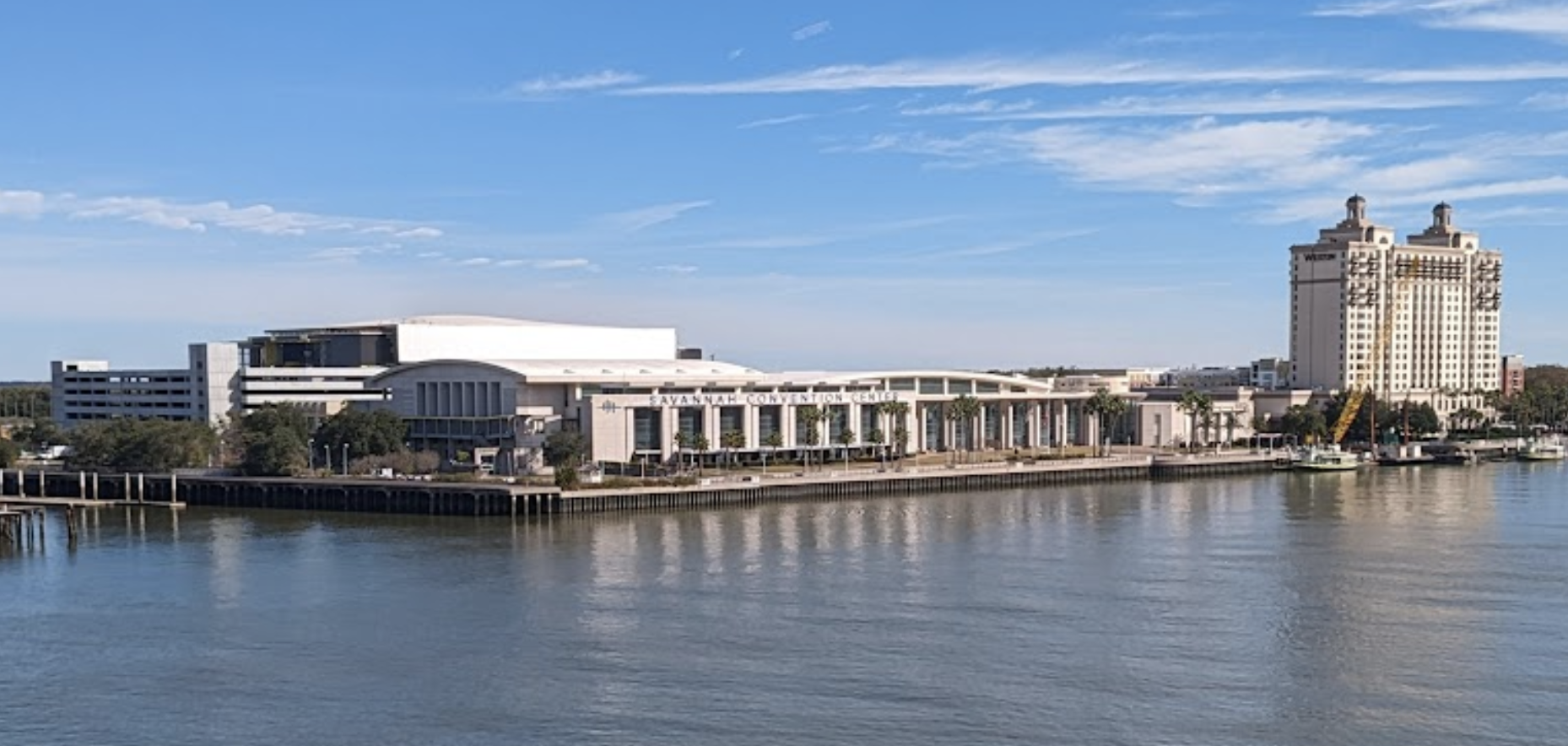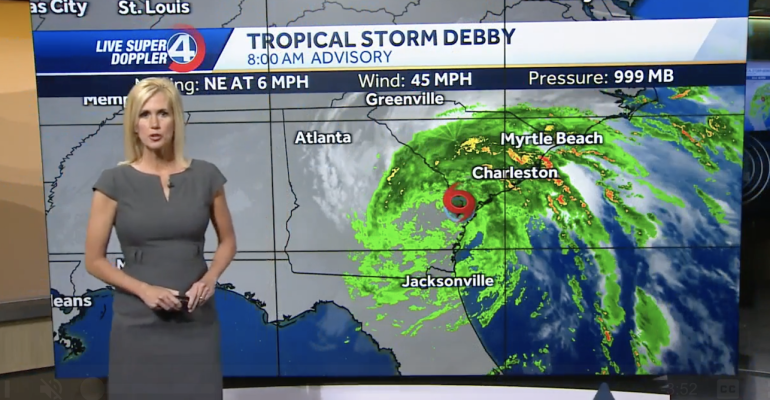Hurricane Debby has left its mark on the southeastern U.S., along with a few meetings that were caught in its path.
On Sunday, August 4, Hurricane Debby came ashore on Florida’s west coast as a category 1 hurricane. But while the winds were not as fearsome as they could have been, rainfall of about 10 inches and a wind-aided storm surge left much of Sarasota and parts of St. Petersburg significantly flooded.
Meanwhile, downtown Tampa—where the city’s convention center and several big hotels reside—narrowly dodged significant flooding, as the Hillsborough River alongside the downtown district crested just below the top of its seawall. However, Tampa International Airport saw more than 150 flights cancelled on Sunday. The good news: No large events were at the riverfront Tampa Convention Center (below, with hotels at back right) at that time.

Unfortunately, once the storm moved across the Florida peninsula to the Atlantic coast, both Charleston, S.C., and Savannah, Ga., found themselves in Debby’s crosshairs, as did a few event groups in those cities.
Related Article: Force Majeure Clauses: Out of Sync with Natural Disasters?
On Tuesday, August 6, Charleston received nearly five inches of rain, but that same amount or more was expected into Wednesday, August 7. "We are at basically zero elevation, at sea level, and we are anticipating unprecedented amounts of rainfall," Charleston Mayor William Cogswell told CNN early Tuesday. "When you couple that with potential storm surges, we're going to have some real issues here."
While there were no events at the Charleston Area Convention Center and none scheduled until August 14, a 150-person medical meeting, the Urgent Care Symposium, was scheduled to take place on Tuesday at the Hilton Garden Inn Charleston Waterfront/Downtown. It was cancelled.
Potential Contract Complications
Savannah received more than eight inches of rain and a four-foot storm surge on Monday, August 5, causing widespread flooding and leading the mayor to designate Enmarket Arena as an emergency shelter for residents.
 For the National College Testing Association, August 5 was day two of its 400-person conference at the Hyatt Regency Savannah. The hotel (right) is located on the western bank of the Savannah River, facing the Savannah Convention Center on the eastern bank. As of press time, NCTA staff could not be reached for comment.
For the National College Testing Association, August 5 was day two of its 400-person conference at the Hyatt Regency Savannah. The hotel (right) is located on the western bank of the Savannah River, facing the Savannah Convention Center on the eastern bank. As of press time, NCTA staff could not be reached for comment.
Starting on Friday, August 9, nearly 1,000 people are set to attend the Georgia Forestry Association’s three-day annual meeting at the Savannah Convention Center (below). GFA did not respond to MeetingsNet’s request for comment on the situation.

Given the uncertain conditions in Savannah, however, it is possible that some GFA attendees might not arrive to their hotels as scheduled on Thursday, August 8—and this is where the attrition clauses within the event’s hotel contracts could become an issue.
Barbara Dunn, partner at Chicago-based law firm Barnes & Thornburg LLP, represents many nonprofit groups and trade associations in their dealings with hotels. She advises that planners make sure that their hotel contracts do not calculate attrition on a nightly or per-night basis. Instead, it should be calculated on a cumulative basis that accounts for the total number of rooms used over all the event dates.
In particular, attendees arriving a day late or leaving a day early due to a storm can cause the guest-room count to fall below the minimum pick-up percentage. So, “if attrition is calculated on a per-night basis, a group would have to pay some attrition for that night even if the room count was well above the minimum on the other nights,” says Dunn. Using a cumulative basis for attrition, however, allows rooms used on other nights to offset the shortfall.
There is no word on how GFA's attrition clauses are structured.
Another veteran legal perspective comes from Joshua Grimes, Esq., of Grimes Law Offices, LLC. "If heavy rainfall makes it 'illegal or impossible' to hold the meeting—the usual words in hotel contracts—then the group could cancel under the force-majeure provision," he notes. "Attrition would apply if the rain didn't amount to a force-majeure occurrence, and damages would presumably apply if the group didn't fill its room-block commitment."
However, to avoid such a scenario, "it would be better if the hotel and planner negotiated a force-majeure clause that called for attrition to be waived if an unforseen event outside the parties' control impacted not all, but a material part of the meeting," Grimes adds. "That would allow an acceptable alternative to cancellation, and still allows each party to perform as much as possible."





